Truthdigger of the Week: Derrick Gordon
The NCAA Division I basketball player's coming out makes it easier to believe the next generation of Americans are more socially tolerant than their elders.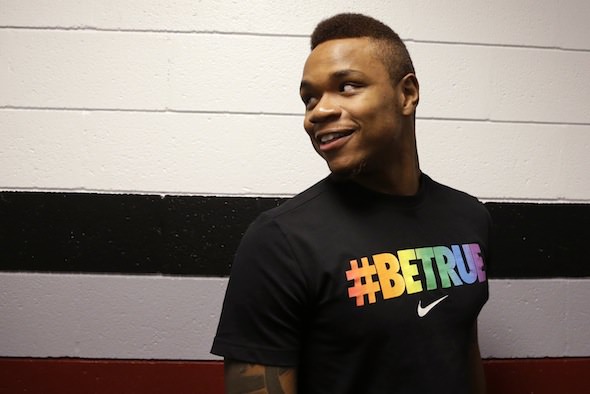
Every week the Truthdig editorial staff selects a Truthdigger of the Week, a group or person worthy of recognition for speaking truth to power, breaking the story or blowing the whistle. It is not a lifetime achievement award. Rather, we’re looking for newsmakers whose actions in a given week are worth celebrating.
Perhaps the most valuable part of Outsports magazine’s story on the coming out of University of Massachusetts basketball player Derrick Gordon — the first men’s Division I player to come out as gay — was writer Cyd Zeigler’s treatment of locker room teasing among young American sportsmen. A growing up ritual that can be as bonding as it is cruel, the provocations traditionally exchanged among boys becoming men were decidedly the latter for Gordon. The “snickers and snide remarks” that began after a photograph of him and a boyfriend outside a gay bar in New Jersey was posted on Instagram almost drove him from the sport.
The teasing slowed when Gordon eventually approached the team, but it didn’t stop altogether. He was straight, he told them. The connotation lingered however. For instance, some teammates would wait until Gordon was done with the showers before entering them themselves. He stayed up nights crying. During one of the most socially important times of his life and after excitedly transferring from another college, he avoided parties and was fearful that his sexuality might be perceived if he were simply observed in public.
“Most of the time when you see me on campus, I’m alone,” Zeigler quoted him as saying. “I eat alone a lot. Since the school year started in September I haven’t been to one party. I’m always working out or lifting or in my room. I do the same thing over and over every day. I feel like I can’t be who I am or live my life.”
“Nobody should ever feel that way,” he added.
Gordon didn’t plan to come out while still in college. For a long time he felt he’d tell his friends and family when school was over, perhaps a few seasons into his NBA career, if his playing took him that way. Introductions to a few openly gay athletes and a decisive trip to Philadelphia changed all that. After seeing the comfort and happiness enjoyed by gay athletes living openly, Gordon’s “depression waned, replaced by hope,” Zeigler wrote.
“After that trip to Philadelphia, coming out and living his life authentically suddenly became urgent for him. He wasn’t going to live in the closet another day. While he had been waiting for another active big-time college athlete to come out publicly, he decided if he had to be the first then that’s what he was going to do.”
Gordon’s coming out occurred earlier this month. At his request, head coach Derek Kellogg called a team meeting. Kellogg broke the ice by telling the team he was gay. This was a trick intended to signal his support for Gordon. Kellogg had been married to his wife for almost nine years. With Kellogg’s support, and two of the gay athletes he had spent previous weeks with by his side, Gordon, “his legs literally shaking,” Zeigler wrote, told his teammates he was gay. As he opened up about his personal struggle with what he felt compelled to conceal, his teammates wept without exception.
As Zeigler told it, the picture of 20 or so young men being vulnerable together in a locker room is a triumph for a society that for nearly 250 years has been defined by violent division. “The impact of their actions hit home when Gordon revealed the speculation [of his homosexuality] was true,” Zeigler wrote, “and that the teasing nearly drove him from the team.”
“It was powerful for these players to see one of their brothers be so vulnerable,” said one of the men who came to support Gordon. “These are some inner-city kids, some rough, tough kids who Derrick wants to be friends with. They understand who he is a little bit better now.” It wasn’t their intent to harm their teammate, Zeigler wrote. The players “didn’t know how to talk with Gordon about their assumption that he was gay, so they relied on locker room teasing.”
“But it wasn’t just the teasing,” Zeigler continued. “So much of the conversation on the team was about girls. It’s a conversation Gordon has never felt part of. While he acknowledged that all of the perspectives in the room have some truth to them, he’s hopeful that now that he’s out to them he’ll be able to share his real dating experiences with them. It will be a true test for the team.”
Gordon has support from outside the team as well. NBA veteran and former Truthdigger of the Week Jason Collins, whom Gordon credited with encouraging him when Collins came out in April 2013, tweeted his praise for Gordon.
I’m so proud of @flash2gordon. Another brave young man who is going to make it easier for so many others to live an authentic life. #courage
— Jason Collins (@jasoncollins34) April 9, 2014
The University of Massachusetts declared its support for Gordon as well. “UMass is proud to have Derrick Gordon as a member of our athletic family and to honor his courage and openness as a gay student-athlete,” athletic director John McCutcheon said in a written statement. “UMass is committed to creating a welcoming climate where every student-athlete, coach and staff member can be true to themselves as they pursue their athletic, academic and professional goals.”
It is being observed in many places that on average, America’s younger generations are superior to their elders when it comes to tolerating social differences. Stories like Gordon’s make it easier to believe that it’s true. We and those who are susceptible to prejudice hear them only because he and others like him courageously step forward. For that, we honor Derrick Gordon as our Truthdigger of the Week.
ESPN:
Your support matters…Independent journalism is under threat and overshadowed by heavily funded mainstream media.
You can help level the playing field. Become a member.
Your tax-deductible contribution keeps us digging beneath the headlines to give you thought-provoking, investigative reporting and analysis that unearths what's really happening- without compromise.
Give today to support our courageous, independent journalists.
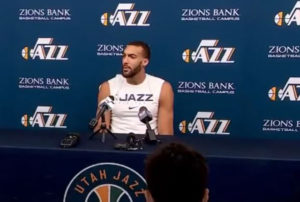
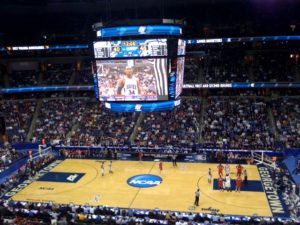
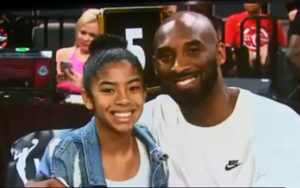
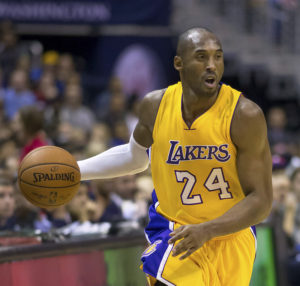
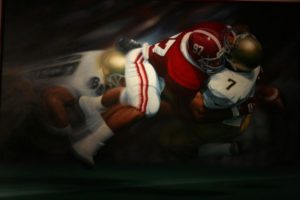
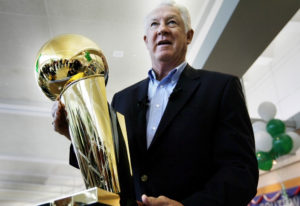
You need to be a supporter to comment.
There are currently no responses to this article.
Be the first to respond.